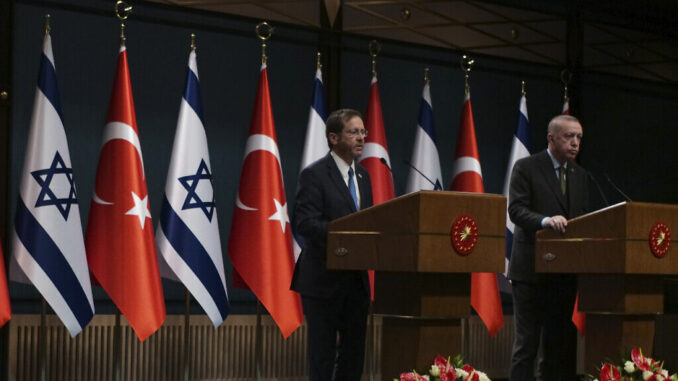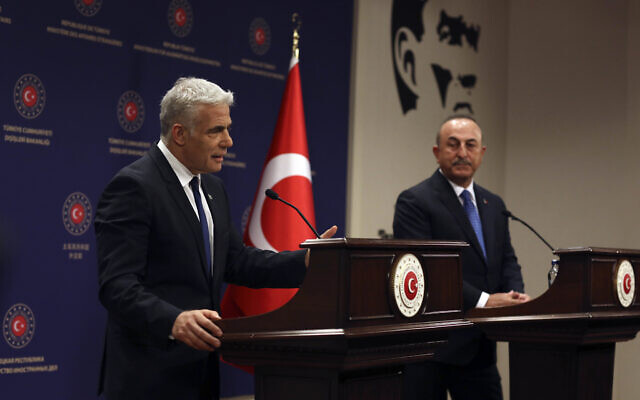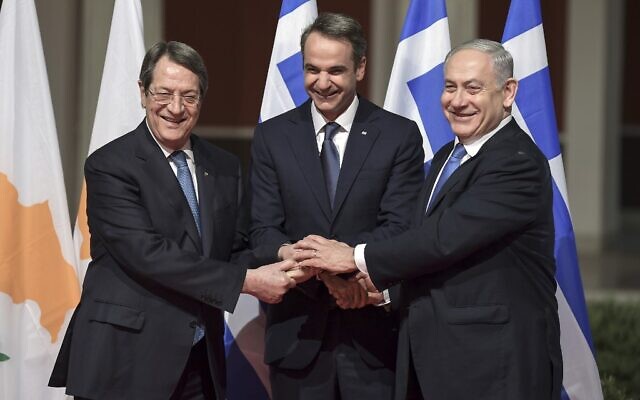Long reconciliation process reaches successful conclusion as ‘frenemies’ agree to swap envoys, a major step that could have important implications for Middle East

Turkish President Recep Tayyip Erdogan, right, and Israel’s President Isaac Herzog speak to the media after their talks, in Ankara, Turkey, Wednesday, March 9, 2022. .(AP/Burhan Ozbilici)
But it does mean that their interests line up on enough important concerns that they intend to pursue a positive bilateral agenda. And they intend to do it in a way that won’t leave the relationship liable to fall apart at the sight of the first rift.
“This shows the ability of the countries to deal with disagreements, and to create frameworks for the disagreements to be discussed without it ruining the bilateral relationship, as happened in past years,” said Nimrod Goren, president of Mitvim – The Israeli Institute for Regional Foreign Policies, a think tank.
This new relationship, combined with Israel’s growing ties with Arab partners, has far-reaching potential for both Jerusalem and Ankara.
But it also has the power to redraw alliances across the Middle East, as Turkey attempts to bounce back from years of international isolation.
Steady progress, led by Herzog
The countries withdrew their ambassadors in 2010 after Israeli forces stormed a blockade-busting flotilla bound for Gaza, setting off a melee that left 10 Turkish nationals dead and a number of Israeli soldiers severely injured.
A 2016 rapprochement fell apart two years later when Turkey recalled its ambassador and asked Israel’s to leave to protest Israel’s response to rioting on the Gaza border, in which dozens of Palestinians were killed.
Turkish and Israeli leaders criticized each other bitterly, with Recep Tayyip Erdogan calling Israel a “child-murdering” country and then-premier Benjamin Netanyahu accusing Erdogan of killing Kurdish civilians.
The long journey to Wednesday’s announcement began in May 2020, as an El Al plane landed in Turkey for the first time in 10 years as part of an operation to bring medical supplies to Israel at the height of the COVID-19 pandemic.
In the ensuing months, Turkey, facing regional isolation, economic woes, and a potentially hostile president in the White House, showed itself the more eager partner. Israel, enjoying growing ties with Turkey’s rivals and insistent on seeing evidence that Ankara wouldn’t pull an about-face, was content to sit back.
The slow process picked up steam over the past year, with a new Israeli government in power and President Isaac Herzog taking an active diplomatic role. After Herzog was sworn in, Erdogan called to congratulate him and the two spoke for 40 minutes.

Mordy Oknin (left), who was jailed along with his wife Natali for photographing the Turkish president’s palace, arrives at their home in Modiin, November 18, 2021. (Yossi Aloni/Flash90)
The presidents have spoken regularly since, including after Herzog’s mother passed away, when Erdogan contracted COVID, and around violence in Jerusalem during Ramadan. Herzog’s relationship with Erdogan was seen as a key factor in the freeing of an Israeli couple arrested on suspicion of spying in Turkey.
Herzog also flew to Ankara in March to meet Erdogan, and was greeted by an honor guard and a band playing the Israeli national anthem, a first since 2008, when prime minister Ehud Olmert visited.
Once Herzog had prepared the ground, the countries’ top diplomats could meet. Turkey’s Foreign Minister Mevlut Cavusoglu, a close ally of Erdogan, met with his counterpart Yair Lapid in Jerusalem in May, before Lapid, who has remained foreign minister, became Israel’s premier.
The next month, amid Iranian efforts to carry out attacks on Israelis in Turkey, Lapid stood beside Cavusoglu in Ankara and praised the security cooperation between the countries.
During that visit, the two diplomats reached an understanding on a gradual process that would lead to the return of ambassadors.

Turkish Foreign Minister Mevlut Cavusoglu, right, and Foreign Minister Yair Lapid speak to the media after their talks, in Ankara, Turkey, Thursday, June 23, 2022. (AP/Burhan Ozbilici)\
As senior officials met, government ministries began taking tangible steps. In July, Israel and Turkey signed the outline of a civilian aviation agreement to replace the existing accord dating back to 1951. The Economy Ministry also announced it would reopen Israel’s economic office in Istanbul, which had been closed for three years.
Alongside the steady progress, there was the risk of significant setbacks. Erdogan slammed Israel’s “oppression” of Palestinians and “violations” in Jerusalem during his 2020 address to the United Nations General Assembly. The bizarre arrest of the Israeli tourists accused of espionage in November 2021 also threatened to derail progress.
And this month, during the three-day Operation Breaking Dawn in Gaza, Erdogan blasted Israel. “We condemn Israel’s actions in Gaza,” he said. “There can be no excuse for killing children.”
But with both sides determined to see the reconciliation process to its successful conclusion, they navigated these episodes quietly and skillfully.
They had compelling reasons to do so.
New strategic dialogue
In the wake of the so-called Arab Spring, which felled Sunni Arab regimes across the Middle East, Erdogan began pushing a regional order rooted in political Islam, supporting the Muslim Brotherhood in Egypt and the Islamist Ennahda party in Tunisia.
But pro-Western authoritarian forces pushed back across the region, and Turkey’s rivals allied themselves against the challenge emerging from Ankara. In the face of increasing isolation and economic challenges, Turkey made a decision to chart a new course in its foreign policy.
Over the decade-plus of tensions with Ankara, Jerusalem was happy to ally with other countries opposed to Turkey and show its value as a regional partner.
Greece, Cyprus, Egypt, Jordan, and European rivals of Turkey came together with Israel around natural gas cooperation in the EastMed Gas Forum. Even though the alliance’s planned pipeline to Europe is unlikely to ever be constructed, the group laid the groundwork for other types of energy cooperation.

Former prime minister Benjamin Netanyahu (R), his Greek counterpart Kyriakos Mitsotakis (C) and Cypriot President Nikos Anastasiadis shake hands in Athens on January 2, 2020, ahead of the signing of an agreement for the EastMed pipeline project designed to ship gas from the eastern Mediterranean to Europe. (Aris Messins/AFP)
Israel also forged the Abraham Accords with the UAE — another rival of Turkey — and Bahrain, and Morocco, and has continued to expand the alliance into tangible agreements. Egypt and Jordan are also showing increasing interest in joining Abraham Accords initiatives, and the US President Joe Biden’s administration has thrown its full backing behind the expansion of the alliance.
By moving closer to Israel, Turkey is likely hoping to come in from the cold.
Beyond the diplomatic isolation, Turkey desperately needs foreign investment. Its total net foreign resources have declined almost 50 percent in the last five years, and direct foreign investment dropped 38% over the same stretch, as the Turkish economy continues to reel from the effects of the pandemic. In March, inflation in Turkey reached 80%, a 24-year high.
Sustained economic growth was the key to Erdogan’s popularity among the Turkish working class as prime minister, and attracting new foreign investment is of prime importance for Turkey’s leader.

An oversized copy of a 200 Turkish lira banknote, featuring a photo of modern Turkey’s founder Mustafa Kemal Ataturk decorates a currency exchange shop in Istanbul. (AP Photo/Lefteris Pitarakis)
Restored ties with Israel are the perfect sign of normalcy needed to calm foreign investors.
Israel, for its part, is looking for a way to pipe its natural gas to an energy-hungry Europe. “The Turks and Turkish Cypriots have both looked warmly on any type of pipeline,” Yusuf Erim, Turkey analyst at TRT World, told The Times of Israel.
Jerusalem is also eager to expand security ties with another country worried about Iranian activities in the region, and wants to see its airlines regain a bigger piece of the lucrative air travel pie between the countries.
The restoration of ties will have further resonance in the region.
“Once the ambassadors return, it opens the door for the resumption of a strategic dialogue between the sides,” Goren pointed out.
With the US reducing its influence in the Middle East, other powers are filling the vacuum, not all of them friendly to Israel. Closer strategic ties with Turkey can help Israel shape the Middle East in a way that is more beneficial, or at least less threatening.

An IDF tank at a military outpost overlooking Syria near the Israeli border in the Golan Heights, May 23, 2022. (Michael Giladi/Flash90)
Syria, a country on Israel’s border in which Russia and Iran are major players, has long harbored serious threats for the Jewish state. But Turkey is also influential there, and wants to see a reduced Iranian presence in a country in which it has carried out major military operations in recent years.
“I think there’s a lot of room for both countries to cooperate in Syria,” said Erim. “They both want the same thing.”
Turkey has also been trying to fix ties with Egypt, but Cairo remains wary over Ankara’s support for the Muslim Brotherhood. Israel could play an important role in that reconciliation process.
Though Turkey and Israel could well expand cooperation in the Middle East, it shouldn’t harm Jerusalem’s close ties with Greece and Cyprus. The 2016 rapprochement between Israel and Turkey was not an obstacle to the expansion of its relationship with Ankara’s Mediterranean adversaries, and isn’t likely to be one now.
Frenemy triangle
An important trilateral relationship between Israel, Turkey, and the UAE could also emerge.
Sheikh Mohammed bin Zayed Al Nahyan, the crown prince of the United Arab Emirates, speaks to Turkey’s President Recep Tayyip Erdogan during a welcoming ceremony at the presidential palace, in Ankara, Turkey, November 24, 2021. (AP Photo/Burhan Ozbilici)<
“Turkey is a frenemy of both Israel and the UAE,” said Moran Zaga, a Haifa University expert on the Gulf. “It is a buffer between countries seen as moderate and countries seen as radical in their politics and foreign policies. The relationship with Turkey determines in many ways regional stability.”
With the UAE seeking stability so it can continue to position itself as a global trade and investment hub, and with its understanding that the US is about to cut a deal with Iran, Abu Dhabi is eager to bury the hatchet with regional powers, including its main adversary Turkey.
Mohamed Bin Zayed, the UAE’s powerful crown prince at the time, flew out to Turkey in November to meet with Erdogan. After the meeting, the two countries inked billions of dollars worth of agreements in trade, energy, technology, banking, and investments.
“Turkey is a massive economy,” said Zaga, “and this triangle relationship could bring major results to the region.




Leave a Reply
You must be logged in to post a comment.